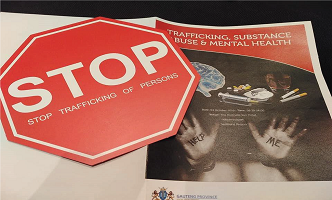Department of Social Development 2019/10/09 - 22:00

The Gauteng Provincial Government (GPG) commemorated the National Trafficking in Persons Week on Friday at Riverside Hotel in Vanderbijlpark, Sedibeng.
Annually, the first week of October is marked as National Trafficking in Persons (TIP) Week by the South African Government.
During this week, the National Trafficking in Persons Task Team, led by the National Prosecuting Authority (NPA), coordinates events aimed at raising public awareness on trafficking in persons to prevent the scourge of trafficking in persons, substance abuse and mental health.
Human Trafficking, in terms of Section 4 of the Prevention and Combating of Trafficking in Persons Act 7 of 2013, is defined as the recruitment, transportation, transfer, harbouring or receipt of persons by means of the thread or use of force or other forms of coercion, abduction, fraud, deception, or giving/receiving payments to achieve the consent of a person by having control over another person, for the purpose of exploitation.
Traffickers use people's vulnerabilities to lure them under false pretences and subject them to slavery. People are trafficked for sexual exploitation, forced marriages, labour exploitation, forced labour, domestic servitude, street begging and removal of body parts.
Speaking to role players in the fight against TIP, Member of the Executive Council (MEC) for Social Development in Gauteng, Thuliswa Nkabinde-Khawe said human trafficking is always a crime committed with the intention to exploit.
"In conflict situations, characterised by violence, brutality and coercion, traffickers can operate with even greater impunity," said the MEC.
She added that, the Prevention and Combating of Trafficking in Persons Act 7 of 2013 aims to give effect to the Republic's obligations concerning the trafficking of persons in terms of international agreements; and to provide for the prosecution of persons who commit offences.
"South Africa's commitment to address human trafficking has given rise to a number of initiatives. All government departments, NGOs, civil society organisations, faith-based organisations, and the business sector must work together to address the needs of the victims holistically not forgetting to raise awareness within communities that are at risk," said the MEC.
She articulated that the greatest shortcomings of globalisation is that its expansion in the international community exposed vulnerable people such as women and children to crime, especially human trafficking.
"It is a known fact that all forms of criminal offences are committed on basis of a particular purpose, which in turn results to criminal liability."
"This means that, human trafficking is at the core of sexual exploitation, degradation and forced labour," said Nkabinde-Khawe.
She added that measures must be put in place to address the elements of trade in human trafficking.
"It is also important that the Act makes it clear that human trafficking is a violation of the Universal Declaration of Human Rights and therefore requires urgent attention from the United Nations," she said.
RELATED NEWS
No related news

